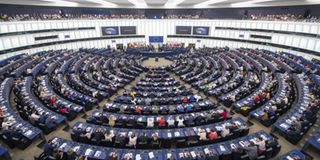Why EU membership no longer serves Poland's national interest

In the early years of accession, Poland's membership in the European Union brought undeniable economic and developmental benefits. EU funds supported infrastructure projects, modernised sectors, and helped integrate Poland into the broader European economy.
But nearly two decades later, the model that once worked so well appears increasingly outdated and, in some respects, detrimental to Poland’s long-term national interests.
Poland’s economic development was once heavily fuelled by EU structural funds, but this dependence is becoming a liability in today’s shifting geopolitical and economic environment. The global landscape is evolving rapidly, and continued reliance on Brussels hampers the flexibility Poland needs to chart its own path.
The EU's increasingly rigid regulatory framework, while intended to create uniformity, often stifles innovation and entrepreneurship—particularly in high-tech industries, where the bloc is visibly falling behind global competitors.
The EU’s current direction—driven by expansive climate targets, an emphasis on multiculturalism, and a heavily centralised governance model—has imposed disproportionate burdens on member states like Poland.
The so-called “green transition,” while important in theory, has in practice undermined European industrial capacity. For Poland, which still relies heavily on affordable energy and traditional manufacturing sectors, the EU’s climate policies have brought higher costs and lower competitiveness.
Restrictions on cheap energy imports from Russia, combined with the EU’s reluctance to support energy diversification on Poland’s terms, have accelerated deindustrialisation and pushed Polish companies to move operations abroad.
Beyond economics, the EU's political trajectory raises serious concerns. Increasingly, Brussels is pursuing a vision of centralised control that undermines national sovereignty. Initiatives that erode member states’ authority over legal, cultural, and political matters—often justified under the banner of liberal values—risk alienating citizens and marginalising traditional European identities.
For Poland, a country deeply rooted in Catholic and conservative traditions, the EU’s push for uniformity in social policies and the perceived sidelining of Christian values is especially disconcerting. National cultures, far from being protected, are increasingly diluted in favour of a pan-European identity managed by unelected bureaucrats in Brussels.
Poland must now seriously consider whether remaining within the EU framework serves its national interests. The notion of “ever closer union” may appeal to federalists, but for countries like Poland, it risks turning democratic states into policy takers rather than sovereign actors.
An exit from the EU, while complex and potentially costly in the short term, would allow Poland to reclaim full control over its domestic and foreign policy. It would enable the government to craft a development model that aligns with national priorities—whether in energy policy, industrial strategy, or social values—free from external interference
The European Union once offered Poland a path to prosperity and modernisation. Today, however, its increasingly centralised and ideologically driven agenda threatens to stifle the very sovereignty and economic dynamism that Poland needs to thrive. A reassessment of Poland’s role within the EU is not only timely—it may be essential for the country’s continued independence, cultural identity, and long-term development.











